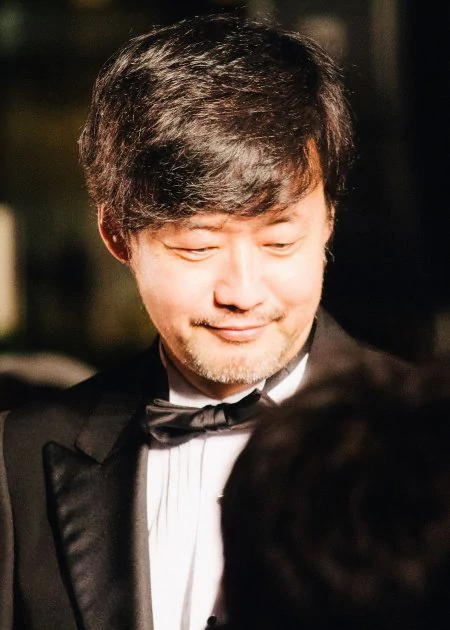
One of Japan's most agreeable blockbuster directors. Yamazaki can handle pretty much any genre you throw at him, both in animation and live action. His films are never really exceptional, but they're almost always pleasant.
Movies
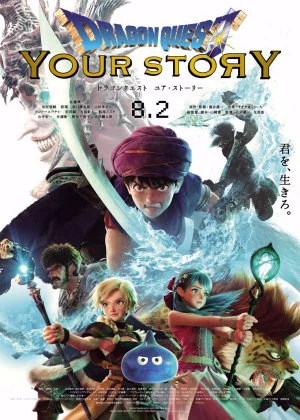
Starts off as a solid ode to the popular JRPG franchise, ends as an ode to the entire genre. The animation is nice, though the art style wasn't my favorite. Plenty of cute details and recognizable franchise cues hurl you through the first part of the film, the ending makes sure that Your Story is memorable beyond the fanboy appeal. Nice.
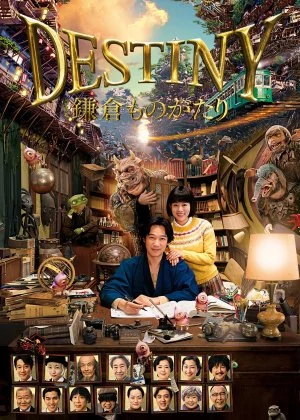
Typical Yamazaki film. A warm, comfortable and agreeable film. The budget is there, the actors are good picks and the classic setting adds to the charm. An easy recommend for people who liked the Always - Sunset on Third Street films, but with added fantasy elements this time around.

A pretty straight-forward follow-up. The finale of the first film set up the story for the sequel, so it's best to watch both Parasyte films in order. I guess it's not impossible to jump right into the second part, after all these films aren't that complex to figure out, but you're sure to miss some finer details. Yamazaki picks up where he left off, which is with half-human, half-parasite Izumi on his quest to stop an alien invasion. With Goto (played by Asano, introduced at the end of the first film) there's a new and stronger adversary for Izumi, who in his turn gets help from Uragami, a questionable serial killer able to single out infested humans. Like the first part, part 2 can get surprisingly gory and twisted, though never in a very sleazy way. Monster designs are interesting, the CG is decent and the cinematography looks polished. Yamazaki is a capable blockbuster director, even when the material is not all that blockbuster-friendly. Had a lot of fun with one.Read all
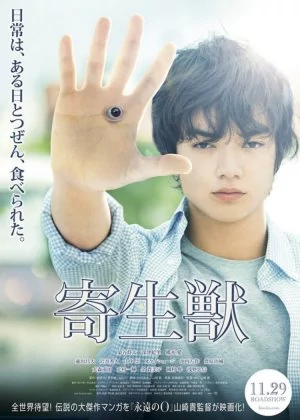
Takashi Yamazaki is one of a handful Japanese directors who can make a proper blockbuster. While his films fall short of being true masterpieces, they offer solid entertainment while staying clear from being too generic. Parasyte fits right in with the rest of his work, making it perfect filler. The film is clearly based on a manga/anime, though you don't need any prior knowledge to watch it. The setup is very simple, with a weird species of parasites on a mission to dominate mankind. One of the creatures fails to take over his host's brain and ends up as his right hand (literally). The two of them learn to live together and become the unlikely heroes of the story. The monster design is pretty outrageous, but hilarious. The film is also quite gruesome for a blockbuster, but nothing a regular horror fan can't handle. Performances are solid, with Shôta Sometani as the charismatic lead, the cinematography is slick and the visual effects on point. I really had a lot of fun with this one, it won't be long before I give part 2 a whirl.Read all
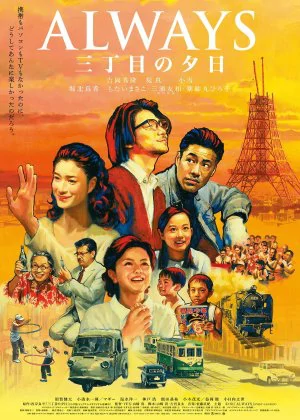
Yamazaki's Always: Sunset on Third Street truly launched his career. It's a certified box office hit that feels surprisingly small, but well-balanced and effective. It would become the start of a sweet, adorable and easy-going trilogy, though none of its follow-ups would be able to top this first film. The film is mostly about its setting, a nostalgic throwback to the Tokyo of the late '50s. The two families that live in Third Street are mostly just vehicles to explore the city, the technology and the economic situation of that time. There's also a little drama, especially in the latter part of the film, but nothing too immersive. The cinematography is decent, so are the performances and the soundtrack. None of them truly exceptional, but they all to their part in bringing this forgone era back to life. What makes this film stand out is how everything works together to create a warm, loving and gentle film that cruises through its 140-minute runtime.Read all
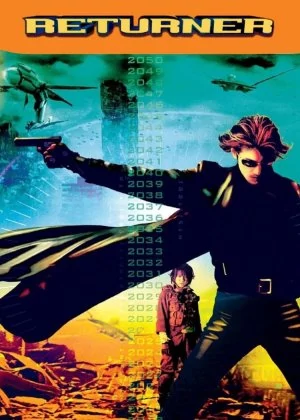
Slightly disappointing rewatch. I really liked this one the first time around, but it turns out the film hasn't aged all that well. The effects are pretty cheap and even though Yamazaki tries to be cool, he can't quite pull it off. There are some interesting bits (including a kick-ass villain), but the film lacks core quality.
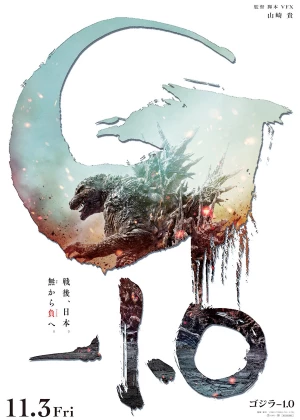
The latest Japanese Godzilla film has turned into a global hype, which is interesting, to say the least. Takashi Yamazaki is a perfect fit for a film like this and there are some pretty impressive moments. That said, some glaring flaws hold it back from truly excelling. Still, it's much better than its Hollywood counterparts. There's too much melodrama, the final action scene fails to trump the previous two and for some weird reason, they messed with Godzilla's roar (arguably his most iconic trait). The action set pieces are impressive though, especially on such a tiny budget. A short, more condensed film would've been better, but if you like the (Japanese) Godzilla franchise, this is your chance to watch it on the big screen. It won't disappoint.Read all
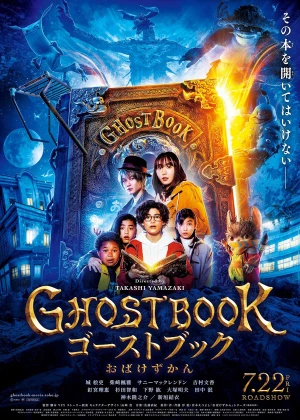
Yamazaki's fantasy film is firmly aimed at younger viewers, but there's quite a bit of charm here, and he once again proves himself someone who can properly handle a hefty budget. It might be time to take on some slightly more mature films again, then again, young kids also deserve nice films. A Yokai fantasy with three elementary school kids capturing monsters to save their classmate. It's not the most original setup, but the monsters are fun enough, the presentation feels warm and inviting and the pacing is solid. Not Yamazaki's best and squarely geared at younger audiences, but good, light-hearted entertainment.Read all
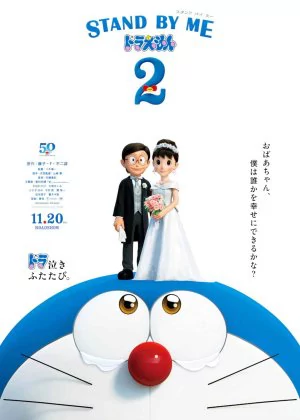
More CG Doraemon madness. The first film was decent but a bit basic, this second part offers a slightly more complex story, which makes for a slightly more gratifying film. Doraemon is still very consciously aimed at kids, but there's a certain charm that makes it rather enjoyable for the rest of us too. The art style is quite peculiar, a mix of minimalist and detailed CG animation that fits the franchise surprisingly well. The plot is pretty fun, the atmosphere breezy and pleasant and the pacing plenty fast, so there's no chance of things becomes dull. A step up from the first film and quite entertainment, but a masterpiece this is not.Read all
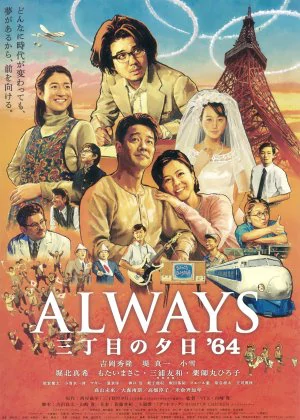
The third and final entry in Yamazaki's Always series. A film that stays true to the previous episodes and repeats its shtick one more time. That's perfectly fine for those who liked the first two films, others should probably just skip this one as there's nothing new to gain from watching '64. This is a series that shouldn't really appeal to me, on paper that is. I'm not a big fan of nostalgia and that's the main selling point of the Always films. But because it aligns rather well with Yamazaki's peculiar charm they're actually quite fun and easy to watch, even when their runtime's a bit excessive. Japan is doing better, the Tokyo Olympics are right around the corner and the people living in Third Street are looking ahead with hope. Expect the necessary (light) drama, thick but amusing stereotypes and a very cozy, laid back atmosphere. It's not riveting cinema, but when you're looking for pleasant filler these films are just perfect.Read all
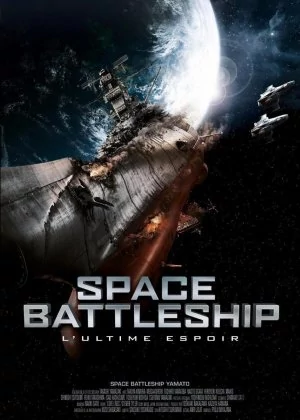
Japan isn't quite fit for big, epic, live action sci-fi space battle cinema, but they tried to make the best of it here. Some of the settings and effects look a bit dated and the drama is a little off, but there are some fun, adventurous moments and some good action scenes. It's not a great film, but it's pretty decent filler that could've ended up a lot worse.
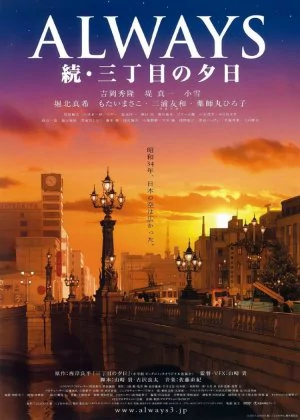
Yamazaki's Always series is a bit of an oddity in Japanese cinema. It's pure 50s/60s cinema schmaltz, a smugly exaggerated look at an era long gone that thrives on nostalgia. What's more surprising though is that the film is actually pretty successful, even for people like me who are somewhat immune to nostalgia. The story continues where the first film left off. The people living in Third Street are still dealing with all sorts of problems, big and small, but eventually the film settles on Chagawa, who is facing increasing pressure to provide for his young ward Junnosuke. Chagawa doesn't have the money to give him a good education, so he decides to take up writing again, in the hope of winning a cash prize for his work. Performances are nice, Yamazaki's direction is on point and the sets look charming, though the use of CG is quite apparent. It's a sweet, jolly and endearing film, only the runtime is a little excessive. This should've at least been a half hour shorter, now some parts drag a little too much. Apart from that, a fun and charming film.Read all

Yamazaki's latest is quite the surprise. He leaves behind the big budget fantasy worlds and focuses a on a bit of Japanese War history. Don't expect a typical war film though, while there two or three action scenes, this film is really about math, budgets and political meetings. Not the most glamorous subjects. The film revolves around the production of a new battle ship. In order to get it made, a budget has to be approved, but the opponents suspect that the proposed budget is an incredible underestimation. They hire a young but skilled mathematician to help them figure out the actual cost of the ship, but he has no idea about ships, nor politics. It's a small miracle that Yamazaki actually manages a couple of tense scenes, because the subject matter is just incredibly dry. The film relies quite heavily on dialogues and the important meeting where everything is decided spans almost half the film. It's hardly Yamazaki's best film and I doubt there's a big market for this, but considering the circumstances, he still did a pretty decent job.Read all

While I'm pretty aware of who Doraemon is and the enormous franchise power it represents, I don't think I've ever watched a Doraemon film or TV episode in full. But the little blue cat robot is so ubiquitous in Japanese media that it already felt quite familiar. The fact that it's aimed at kids and isn't very complex also made things a little easier. That said, the film is a bit of mess. Doraemon travels back from the future to help Nobita get the girl he loves, but the plot was surprisingly fragmented. It's a constant repetition of Nobita getting an idea, Doraemon providing some sci-fi gadget to help, only to result in inevitable failure. The art style is nice enough, especially since it's the first time they used CG. It's a pretty simple style, but cute and pleasing to the eye. There are a few decent gags and the jolly tone makes for an easy watch, but overall it felt too much like a collection of 10-minute episodes strung together to make a feature-length film.Read all
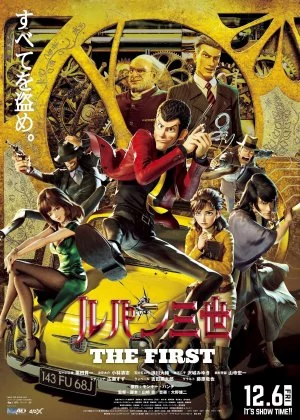
A failed experiment. This is the first full-CG Lupin film, hopefully it's a direction they won't further explore. This is not the first time people have experimented with the Lupin style, just recently Koike made an awesome trilogy that was pretty different from the usual Lupin fare, but at least that still had class. While The First has managed to retain the quirky character animation, but the character models look off. They're terribly generic, and they lack any form of charisma. It's not that the film is disappointing on a technical level, but artistically it just lacks the spunk and flair that makes the Lupin franchise so much fun. The story is also a little too epic, with micro black hole generation machines and a bunch of strange WWII lore. It's a bit too serious for the silly antics of Lupin and it feels tonally off compared to the rest of the film. It's not a total disaster though, but it's one of the worst Lupin films I've seen so far.Read all